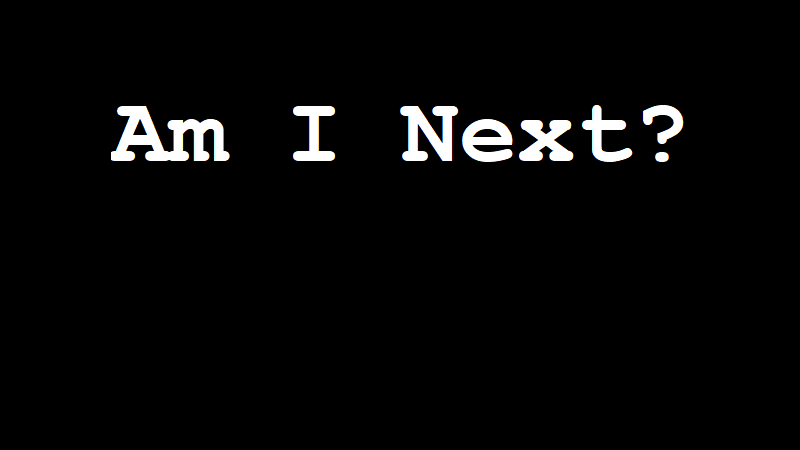Late last week, South Africa was harbouring hope of finding missing 18-year-old UCT student Uyinene Mrwetyana. She had disappeared on Saturday after leaving her residence in Claremont, Cape Town, to visit the post office. On Monday, all that hope, and the #BringNeneHome campaign that inspired it, disintegrated.
News broke that a 42-year-old man confessed to killing and raping Uyinene Mrwetyana in a post office in Claremont, on the same block as a police station.
No ad to show here.
As the clock ticks over to 10pm on Monday evening, Twitter’s a spider’s web of hashtags highlighting the country’s history of violent crimes against women. They’re all dire. #RIPUyinene. #EnoughIsEnough. #SAShutdown.
But one stands out as the most appalling: #AmINext.
“The most stressful thing about #AmINext is that you could literally be next, it’s not just a #, it’s our sad reality and I’m fucken[sic] terrified,” wrote one woman, as the hashtag began trending across the country on Monday.
It might be another hashtag, but it also represents the horrific reality of daily life for millions of women living in South Africa.
The most stressful thing about #AmINext is that you could literally be next, it’s not just a # , it’s our sad reality and I’m fucken terrified
— Sunshine
(@_Queen_Fifi) September 2, 2019
Using it in similar fashion to #MeToo in 2017, users recounted agonising experiences, expressed their hurt by “empty outrage”, and disappointment that nothing has changed in the last decade. South Africa remains one of the most dangerous places in the world for women.
“Being a woman in South Africa is a death sentence,” one user quotes.
Many feel the same way.
https://twitter.com/sthebee/status/1168504820430491649
https://twitter.com/Hlehle_Lupindo/status/1168562917572317184
https://twitter.com/MsSihleBolani/status/1168575291708629005
I'm even scared to leave my friend's place to where I'm staying because I don't know if I'll become the next victim. I don't feel safe walking alone in the streets alone
#AmINext — Mmamogolo Lolo
(@Lora_Labarb) September 2, 2019
I'm so terrified
I'm scared
I'm frightened
I'm fearful
I'm panickingI'm a woman living in SA!!! #AmINext
— Siya The Girl
® (@CeeYaNonoise) September 2, 2019
https://twitter.com/Annie_Kolatsis/status/1168524311944151042
I’m scared for myself!
I’m scared for my daughter!
I’m scared for my sisters!
I’m scared for my friends!#AmInext— Dimpho Mthimunye (@Dimpho_Mthi) September 2, 2019
Being a woman is a whole lot and I'm not even sure there are words to accurately describe what we go through, on the daily! #AmINext?
— Gen (@justgeeb) September 2, 2019
"Being a woman in South Africa is a death sentence"#AmINext
— beeh muhles (@barbie_tings) September 2, 2019
my heart is heavy.
i am scared.
i am not okay.#AmINext— n d e s h y
(@berrrry24) September 2, 2019
I'm so terrified
I'm scared
I'm frightened
I'm fearful
I'm panicking#AmINext pic.twitter.com/W84zl4GGmf— Ausi Masentle (@masentle_mo) September 2, 2019
Women & children kidnapped.
Women & children raped.
Women & children beaten.
Women & children killed.
Every day.
Mr President @CyrilRamaphosa @PresidencyZA @GovernmentZA @SAPoliceService this is a crisis. We do not need PR responses, we need a serious plan backed by action.— Hulisani Ravele (@HulisaniRavele) September 2, 2019
If you’re aimlessly scrolling through #NotAllMen tweets and wondering why women in South Africa feel this way:
In 2013, 17-year-old Anene Booysen was gang raped and disembowelled in Bredasdorp, Western Cape. She was still alive when she was found but died later in hospital six hours later.
Also in 2013, Reeva Steenkamp was shot and killed by her boyfriend in Johannesburg. Former Paralympic athlete Oscar Pistorius was sentenced to more than a decade in prison almost four years later.
In 2017, users took to Twitter in hopes of finding Karabo Mokoena, a 22-year-old who went missing in Johannesburg. Her body was found burned. Her ex-boyfriend was later convicted of murder.
Last year, a seven-year-old girl was raped in a Pretoria restaurant. The 22-year-old man accused of raping her is set to begin trial this month.
Earlier on Monday, a Grade R girl was kidnapped from her school in Vanderbijlpark, Gauteng. The kidnappers are now requesting a ransom of R2-million in exchange for the girl.
A day earlier, 14-year-old Janika Mallo was found dead, lying face down in her grandmother’s backyard. Her skull was struck by a “concrete block”. The gruesome report by IOL suggested that she may have also been raped.
There are so many more stories of suffering.
Twitter users on Monday took the opportunity to highlight other missing persons across South Africa, using the trending hashtags.
https://twitter.com/Gabriel_Tjabadi/status/1168578808041148417
#SAShutdown… Till today my friend and colleague was never found… Where is our police… #EnoughIsEnough pic.twitter.com/alyMxGzBe2
— nicolamazibuko (@nikitahmazibuko) September 2, 2019
A number of protests are reportedly planned across South Africa this week, part of the #SAShutdown campaign gaining momentum on Twitter and Facebook.
Hashtags are powerful forces online. Issues in South Africa, in particular the #ZumaMustFall and #FeesMustFall campaigns, are just two examples of how they’ve fuelled and fundamentally transformed activism in the real world.
But #AmINext is more than just text on a screen or the beginnings of another protest movement.
It’s a distressing, foreboding cloud of fear that hangs over women in this country every day. It’s a conversation that has to be followed by tangible action. It should earmark the beginning of this 25-year-old country’s attempt to fix itself.
“Am I next” is a question that no woman should ever have to ask.
Feature image: Memeburn
